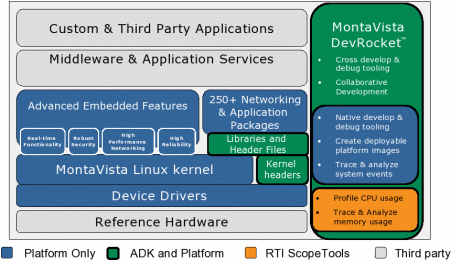MontaVista’s embedded Linux app dev tools go “all-plugin”
Apr 6, 2007 — by LinuxDevices Staff — from the LinuxDevices Archive — 7 viewsMontaVista has released a new version of its Eclipse-based toolsuite for embedded Linux application development. Application Developer Kit (ADK) 5.0 features an “all-plugin” architecture for better cross-vendor tools interoperability, supports MontaVista's new real-time oriented Pro 5.0 distribution, and comes with… powerful analysis tools and virtual targets, the company said.
MontaVista launched ADK in July of 2004, positioning it as a less expensive version of its complete “Platform Development Kit” (PDK). Whereas PDK includes features aimed at board bring-up and kernel debugging, ADK includes only the basics needed by application developers, including libraries and header files needed to build applications that run on MontaVista Linux.

ADK v. PDK components
(Click to enlarge)
The ADK 5.0 release appears to represent the first time MontaVista has shipped an Eclipse-based toolsuite with an “all-plugin” architecture. A PDK 5.0 product is also listed on the company's freshly updated website; however the company has not yet issued a formal statement touting PDK 5.0 availability.
Earlier versions of the company's tools (formerly branded as “DevRocket”) have relied on the CDT (C/C++ development tool) editor/IDE, which limited their ability to interoperate with Eclipse frameworks offered by other vendors. The company announced plans to go all-plugin last November, simultaneously launching an open beta of plugin-based DevRocket tools.
MontaVista competitor Wind River has also shifted away from the CDT editor, adopting an all-plugin architecture in its Workbench 2.6 release last December.
Eclipse Foundation executive director Mike Milinkovich stated, “MontaVista is doing Eclipse right. By offering their DevRocket 5.0 IDE as a set of compatible plug-ins, their user[s] will fully benefit from the vast Eclipse ecosystem.”
ADK 5.0 features
In its statement announcing the new tools release MontaVista claimed its ADK 5.0 to be “the most easy-to-use embedded Linux development platform available.” The product has been “thoroughly enhanced and redesigned to reduce the complexity of embedded Linux application development and analysis,” it added.
Touted ADK 5.0 features, benefits, and capabilities include:
- MontaVista Linux (MVL) Edition Management — Discovers MVL 3.x, 4.x, and 5.x installations, and provides build and debug access to those installed toolchains and LSPs. Includes MVL Pro 5.0 glibc and uClibc toolchains, and one cross-architecture toolchain.
- MontaVista Target Management — SSH connection for Eclipse Remote Systems Explorer (RSE) services on MVL targets; helps users manage target file systems, processes, and console services on MVL targets; automates debug and analysis tasks on MVL targets.
- C/C++ Developer Toolkit (CDT) Extensions for Managed Make — Ues CDT Makefile format for building and debugging remote applications; enables access to debug/release build profiles; builds applications, static libraries, and shared libraries; includes Make support for kernel builds.
- Dynamic Tool Chain Selection — Lets users access and switch between discovered toolchains within MVL projects; provides access to the local GCC tool chain within MVL projects.
- Memory Debugging — Said to automate and configure MPatrol to find memory leaks; GUI helps users discover memory leak sources.
- Performance Analysis — Said to automate and configure OProfile for statistical profiling of system and/or applications; GUI helps users discover the source of performance bottlenecks.
- Memory Usage Analysis — Provides an overview of total available system memory and a graph of relative usage by the kernel and applications; shows kernel memory used by buffers, cached pages, code, slab allocator, date, page tables, and vmalloc; drills down into applications to show a detailed memory map and which percentage of each section is resident.
- Virtual Target Platform (ADK only) — Provides a bootable MVL Pro 5.0 virtual environment; allows boot of custom file systems; provides tools and configuration for advanced debugging and analysis.
- Trace Analysis (PDK only) — TimeDoctor Eclipse plug-in GUI for loading and displaying LTTng (Linux trace toolkit, next generation) trace files.
- Platform Image Builder (PDK only) — Lets users select available MVL or user packages; enables replacement of kernel and user packages with custom versions; performs dependency resolution and conflict analysis; supports creation of separate image for different mount points; writes to a wide range of target file systems.
Jim Ready, CTO, stated, “Creating and optimizing applications for embedded Linux environments used to be a cumbersome and difficult process for many application developers. What's been missing in the industry are new enhancements to development tools, including tighter integration with open-source Eclipse plug-ins, [and] graphical user interfaces that make Linux application development uncomplicated and straightforward to nearly any application developer.”
According to Steve Balacco, who heads up Venture Development Corp.'s embedded software research practice, “Today's Linux developers need a flexible, feature-rich platform. Comprehensive solutions such as MontaVista's ADK 5.0 are expected to offer increasing efficiency.”
Availability
MontaVista ADK 5.0 appears to be available now, with support for x86, ARM, MIPS, XScale, and Power (PPC) target architectures, and development hosts running Red Hat Linux 9.0, RHEL 3.0, SUSE Linux 9.2, SLES 9.0 Solaris 8-9, and Windows 2000/XP. Pricing was not disclosed.
This article was originally published on LinuxDevices.com and has been donated to the open source community by QuinStreet Inc. Please visit LinuxToday.com for up-to-date news and articles about Linux and open source.